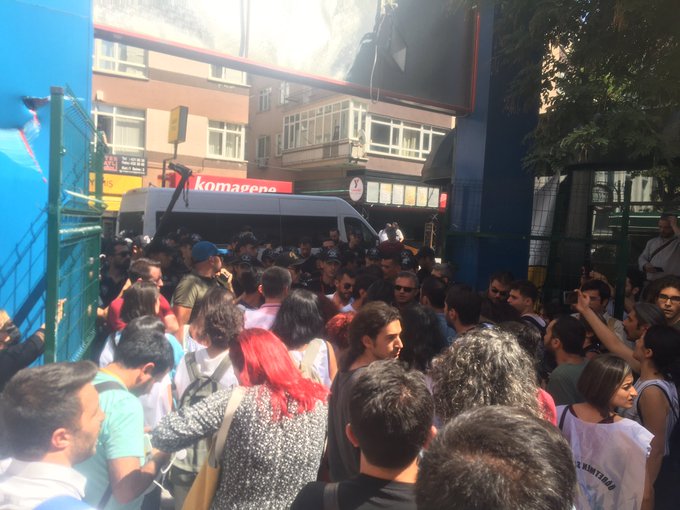A meeting of the Private Sector Teachers’ Union (which has been operating for about a year) was held on August 30, 2022 in Ankara. It was a very well organized meeting with over 200 teachers attending. Their demands were also very clear. This was reflected both visually and audibly, from the posters inside the hall and the well balanced speeches. Then, the meeting participants decided to go outside the Ministry of National Education to make a press statement. That’s when the police attack began.
Background
Employees in Turkey are legally divided into two categories, civil servants and workers in the private sector. Workers’ unions can bargain collectively, but civil servants’ unions cannot. In order for a labor union to conclude a collective bargaining agreement, it must have organized 1 percent of all workers in the industry. This figure was 10 percent until recently (2014). Unions are forced to organise according to specific lines of businesses. A total of 20 business lines have been defined in Turkey by the state. The teachers’ union has to organise in the Trade, Office, Education and Fine Arts business lines. However, the scope of these business lines is very broad. According to the data of the Social Security Institution, as of 2022, 3,959,776 workers are working in this business line. This means that the Union, in order to be able to engage in collective bargaining, has to organise 1 percent of almost 4 million workers (40,000), which is practically almost impossible!
There are 300 thousand teachers in private sector institutions. Out of a total of 180 thousand academics, 30 thousand work at private universities. 30 percent of all education activities in Turkey have shifted to private schools. Wages, which were relatively good at the beginning, have been further lowered as privatization, precarization and unemployment have become widespread. With the repeal of the law stipulating that civil servant teachers and private sector teachers should be paid the same salary in 2014, private school teachers are now mostly forced to work for wages below or equal to the minimum wage and on fixed-term contracts. Private school teachers are employed for 10 months a year, thus they don’t have wages or any other income for two months every year. Teachers are forced to work in an environment where the reputation of the teaching profession is discredited, due to the profit-driven approach that sees students as customers.
The Teachers’ Union fields of struggle
The Teachers’ Union was established in 2021 to respond to these specific conditions. The union has 4,000 members in 60 out of 81 provinces in Turkey. It’s members could significantly increase if state rules for unions were different, for example those who do not have insurance or their line of business does not comply cannot be registered.
Established with the aim of being an independent class and mass organization, the union advocates public education based on social needs. It puts forward the idea of being a strong component of the general labor struggle against the system that sees education as a commodity and education workers as slaves.
Two basic and urgent demands of the union regarding the personal rights of teachers stand out. The most prominent demand is the introduction of a base salary to apply to all private education institutions and the determination of wages based on civil servant salaries, as was the case before 2014. Thus, they aim to put an end to wage contracts at or below the minimum wage.
Secondly, they want an end to the fixed-term contract practice, which reflects the precariousness of the teacher-workers.

The union took up some important battles in a year’s time. The first struggle was for the “right to resign”. Through this struggle, the union achieved to abolish the article of law prohibiting private sector teachers from resigning during the year. Another battle which was fought through petitions, was about teachers who were forced to work during their holidays. The union is constantly campaigning for unpaid teachers. Partial success has also been achieved on the duration of the vacation right of teachers.
The union also put forward the struggle for the recovery of the right to the base salary, indefinite-term contracts and job security, against mobbing, under-insurance, and work paid by the hour.
The Union also fights for:
- Public control of schools and against privatization.
- Education workers to be in alliance and common struggle with parents and students.
- A change in the law that demands unions to organise according to specific business lines and achieve the 1 percent threshold of a huge number of workers in order to be able to collectively bargain with the bosses.
Legitimate struggles and police attacks
At the end of the meeting, the union wanted to make a statement by walking in front of the Ministry of National Education with the 200 people (including children) present at the meeting. However, the police prevented the crowd from leaving the building by establishing a barricade at the garden exit of the meeting place. After negotiations, the union decided to go to another point in the city, very close to the building where the meeting was held, by walking silently, without slogans, from the pavement and making its statement there. The police also blocked this attempt on the grounds that August 30 (the “Victory Day” in Turkey) is a public holiday. The attack began when the crowd turned towards the garden gate to exit the building.
During the attacks that lasted for about 2 hours, the police pepper sprayed the faces of people approaching the garden gate, causing serious injuries. 11 people, 2 of whom were lawyers, were detained as the police attacked the crowd many times. They closed all the main roads to car traffic so they could isolate the protest and caused a serious traffic jam in the main roads of the city. The police circulated the protestors, preventing them from going anywhere. In the end, this hostage situation ended with the people leaving the garden in groups.
During this time, a wide social media campaign was carried out. #ÖğretmenlerGözaltında hashtag has been in the top three in Turkey in the last 24 hours. We are used to the situation where the police does not permit a press release even though they are not legally entitled. However, it would not be easy for them to explain this situation, where 200 people were taken hostage in the garden. For this reason, as this issue came to the fore in social media, the police started to make announcements again and again, saying that people were free to go out of the corridor they created. However, this was not true. It was not safe to pass by the police forces alone in an environment where tear gas and physical violence was continuously used. The constant tear gassing forced us to decide to move the babies and children of the participants to the second floor of the building, as the tear gas on the first floor was visibly affecting their breathing. To move them through the police corridor was out of the question.
At the end of the day, the 11 detained people were released after health checks. Even the head of the main opposition party (CHP) shared a video of the attack. Due to the big publicity, the Minister of Interior activated the tactic of criminalizing union members publicly denouncing certain people that were in the protest. In Turkey, there has been a long period of time in which everyone who is not a member of the government parties is turned into an enemy. If this party is HDP, there is an effort to directly assosiate them with “terrorism”.
This was just one ordinary day in the life of the social opposition in Turkey, in the life of the Teachers’ Union, in the life of any person fighting for workers rights and justice in the country. It has once again demonstrated how vital joint struggle is for winning basic democratic rights, for living in a more humane society.



